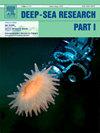Faunal colonists, including mussel settlers, respond to microbial biofilms at deep-sea hydrothermal vents
Abstract
Colonization processes at dynamic deep-sea hydrothermal vent ecosystems ultimately determine ecosystem structure, function, resilience, and recovery. Microbial biofilms form rapidly on surfaces near hydrothermal vents and are continuously exposed to the highly variable abiotic environment. Thus, biofilm microbes may provide a temporally integrated signal that can indicate whether the habitat is suitable for faunal colonists. This study explored the role of microbial biofilms in controlling faunal colonization through in-situ colonization experiments at Tica Vent in the 9°50’ N region of the East Pacific Rise (EPR). Short-term experiments (∼2 weeks) were conducted by deploying colonization surfaces (“sandwiches”) either with an established biofilm (developed for >1 year) or a fresh biofilm (developed throughout experiment) in zones characterized by different faunal assemblages. Differences in associated larval settlers, faunal immigrants, and microbial communities according to biofilm age across multiple biogenic zones were investigated. Faunal and microbial community compositions significantly differed according to whether the sandwiches had established or fresh biofilms as well as the biogenic zone they were deployed in. Several faunal colonists, including settlers such as the foundational chemosymbiotic mussel Bathymodiolus thermophilus and the nectochaete Archinome sp., were found associated more with established biofilms than fresh biofilms. Microbial biofilm communities were dominated by putative chemoautotrophic members of the Campylobacterota phylum and Gammaproteobacteria class and several microbial taxa were found to covary with faunal colonists. Overall, these findings show that microbial community composition plays a role in larval settlement and animal migration in hydrothermal vent systems and the detection of microbial and faunal interactions provides a starting point for identifying key microbial characteristics influencing colonization processes at hydrothermal vents.

 求助内容:
求助内容: 应助结果提醒方式:
应助结果提醒方式:


